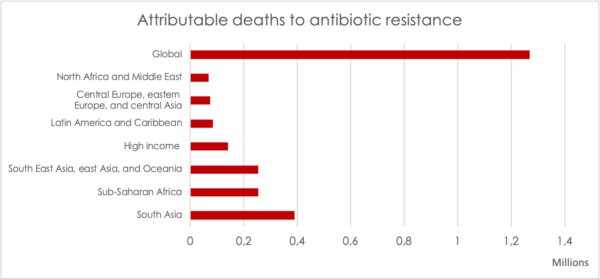The UNDERSTAND focus area of the toolbox provides information and tools for increased knowledge about bacteria, antibiotics and antibiotic resistance, and aims to explain why antibiotic resistance has become one of the major health challenges of our time. The focus area further discusses why it is important to take action against this negative development and gives an introduction to possible ways to do so.
The narrative text is accompanied by “Selected resources” for more in-depth information. Browse through then pick and choose what material is most helpful for you!
Antibiotics – cornerstones of medicine
The discovery and introduction of antibiotics to treat bacterial infections is one of the single most important advancements in human medicine. Antibiotics are used for everything from treatment of common infections like pneumonia and gonorrhea to prevention and treatment of infections that can arise after surgery or cancer chemotherapy. Likewise, antibiotics are crucial in food animal production for treatment of sick animals, and in turn to secure productivity. Overall, antibiotics have greatly improved human health and animal welfare. They really are the cornerstones of modern medicine.
Antibiotics are becoming less effective
Unfortunately, the rising levels of antibiotic resistance threatens to leave us without effective treatment of bacterial infections. Over time, some bacteria have found means to avoid and survive the action of antibiotics. As resistance increases, antibiotics stop working. Use and misuse of antibiotics in health care, food production and by people in the community lead to the selection and proliferation of antibiotic resistant bacteria. These resistant bacteria can spread between people, animals and in the environment, facilitated by poor hygiene and sanitation practices, human travel and trade. At the same time, very few new antibiotics are under development.
Antibiotic resistance – already a major health problem
Antibiotic resistance is already a severe problem worldwide. Or as stated by the World Health Organization: “Antibiotic resistance is one of the biggest threats to global health, food security, and development today”. In January 2022 the most comprehensive data to date on the global health burden of antibiotic resistance was published in the Lancet.
An estimated 1.27 million deaths were found to be a direct result of antibiotic resistant bacterial infections in 2019 – a magnitude at least as high as major infectious diseases such as HIV or malaria. 1 in 5 deaths from resistant bacteria occurs in children under 5. Many more have suffered from resistant infections but recovered. Figure below by ReAct.
The data further shows that the burden of antibiotic resistance falls disproportionately on low- and middle-income countries.

Antibiotic resistance – a global development issue
Antibiotic resistance is often wrongfully depicted as purely a medical problem, presumably because of the direct and devastating consequences that patients with resistant infections may experience. Such narrow perspective however prevents the issue from being recognized as a systems failure and from getting the broad political attention it requires. In fact, having effective antibiotics is a prerequisite for the successful achievement of many of the global sustainable development goals (SDGs). Find out more: Antibiotic resistance – far more than a medical problem. Figure below by ReAct.
A complex issue
Antibiotic resistance is complex, and so is the response to manage the situation. To halt the spread of resistance, multiple interventions are needed on many levels in society all around the globe. The only true way forward is to apply a holistic perspective and act globally. This means that both the human and animal sectors as well as environmental and financial consequences must be taken into consideration. All efforts are important, from decisions and actions by individuals to large-scale initiatives by governments and international organizations.
Selected Resources
| Resource | Description |
| The Global Research on Antimicrobial Resistance (GRAM) findings launch | Webinar discussing the antimicrobial resistance burden globally, based on findings of the GRAM study released in 2022. |
| Effective antibiotics – essential for children’s survival | Fact sheet from ReAct providing key examples on how antibiotic resistance affects children around the world. |
| Successful cancer treatment relies on effective antibiotics | Policy brief from ReAct explaining how and why antibiotic resistance affects cancer care and the treatment outcomes of cancer patients. |
| The urgent case for antibiotic-free animals | Video. TED talk by Leon Marchal about the reasons behind the overuse of antibiotics in livestock, its consequences, and how we can take measures to avoid the increase of antimicrobial resistance (11 min). |
| What do we do when antibiotics don’t work any more? | Video TED talk by Maryn McKenna on the consequences of antibiotic resistance and what may happen if we don’t start acting now (17 min). |



